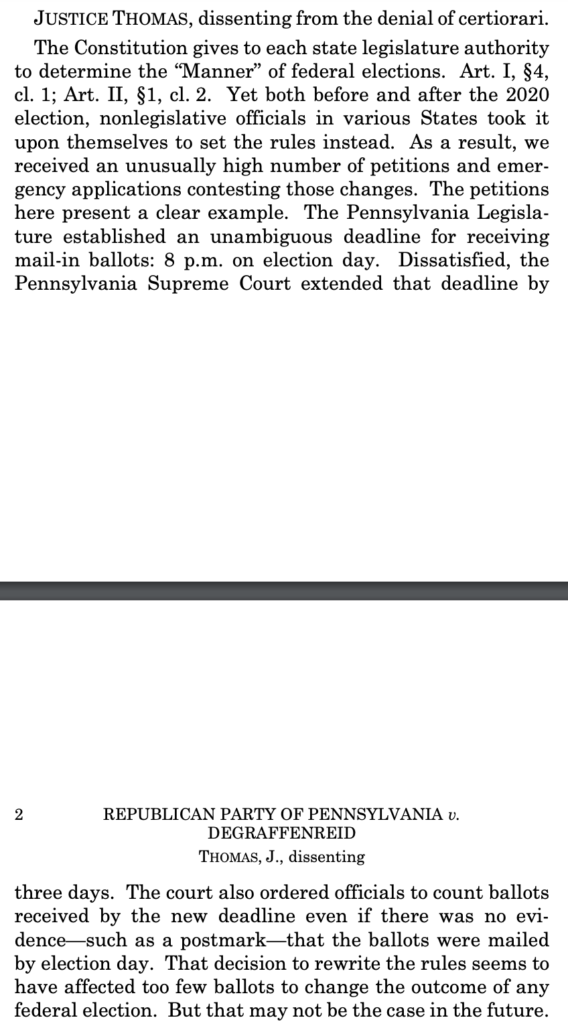Clarence Thomas asserts that imaginary voter fraud justifies extensive vote suppression

The Supreme Court earlier this week rejected a moot challenge to COVID-specific decisions in Pennsylvania to extend voting deadlines. Clarence Thomas responded by going the full Jim Crow. It starts with this ridiculous argument Republicans have convinced themselves makes sense:

Section 5 of the Pennsylvania state constitution guarantees that “[e]lections shall be free and equal.” It interpreted this clause as requiring special measures be taken during the pandemic (and deliberate sabotage of the USPS by the Trump administration). This is a perfectly reasonable interpretation, and the idea that the state legislature given a power in the first instance preempts any further judicial review to ensure constitutional compliance — the only possible federal question — is absolutely nonsensical unless you oppose judicial review entirely.
He then, as Mark Joseph Stern explains, went on to endorse Trumpian bullshit about mail-in ballots:
In his dissent, Thomas cast doubt on the legitimacy of the 2020 election by questioning the security of mail voting. “Voting by mail was traditionally limited to voters who had defined, well-documented reasons to be absent,” he wrote. The current trend toward more “permissive” mail voting, the justice warned, “vastly” increases “the risk of fraud.” Thomas drew heavily from a 2012 New York Times article focusing on Florida’s mail voting regime, which focused on a handful of fraudulent schemes involving mail ballots. The justice also pointed to a Republican operative’s criminal attempt to steal an election in North Carolina using mail ballots.
In reality, this kind of voter fraud is vanishingly rare, and its few perpetrators have been caught and prosecuted. An unprecedented number of states allowed everyone to vote by mail in 2020, and election security officials in Trump’s own administration deemed it “the most secure in American history.” This did not stop Thomas from condemning mail voting as a threat to “election confidence.” In a strikingly cynical move, the justice argued that laws curtailing mail voting may be justified without proof of fraud to prevent “the appearance of corruption.” He drew this standard from the campaign finance context, in which the court has upheld limits on political spending to bolster public confidence that lawmakers are not corrupt. According to Thomas, that doctrine also allows states to crack down on vote by mail even “where allegations” of fraud are “incorrect.” Why? To guard against the mere “appearance of corruption.”
What’s particularly cynical about Thomas invoking campaign finance law to claim that avoiding even “the appearance of fraud” [including that generated willfully by dishonest sore losers like Donald Trump and Clarence Thomas] justifies abridging the right to voter is that he rejects this premise even in the context of campaign finance reform:
In other words, the fact that election officials uncovered virtually no fraud in 2020 does not prove that no fraud existed. It might just mean that fraud is difficult to detect. If this line sounds familiar, that’s because it is what Trump and his allies argued when seeking to undermine public confidence in the election results.
Somehow, this concern about fraud only applies to elections in Thomas’ world. The justice actually rejects the argument that campaign finance reforms may be justified to prevent the “appearance of corruption.” He is transplanting a doctrine that he does not support into a new context to shore up the legality of voter suppression laws. In the process, he is bolstering Trump’s paranoid attacks on mail voting, lending judicial credence to two foundational elements of the big lie: First, that vote by mail is inherently unsafe and insecure, and second, that fraudulent mail-voting schemes may be rampant yet “undetected,” vindicating Trump’s ridiculous claims that his voters are right to doubt the outcome of the presidential race.
Fortunately, Thomas wrote alone here, although I suspect these positions will have more support when confronted with a live case. In the meantime, he’ll have to content himself with voting to destroy what’s left of the Voting Rights Act later this term.


